初中英语八种时态归纳复习
初中英语八种时态归纳复习
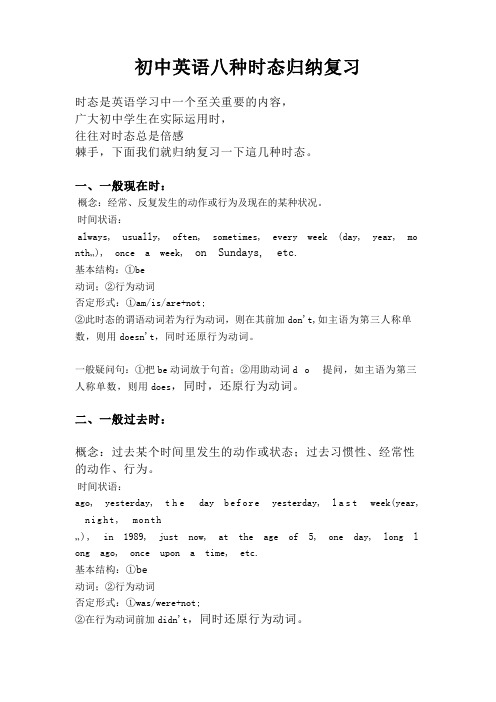
初中英语八种时态归纳复习时态是英语学习中一个至关重要的内容,广大初中学生在实际运用时,往往对时态总是倍感棘手,下面我们就归纳复习一下這几种时态。
一、一般现在时:概念:经常、反复发生的动作或行为及现在的某种状况。
时间状语:always, usually, often, sometimes, every week (day, year, mo nth…), once a week, on Sundays, etc.基本结构:①be动词;②行为动词否定形式:①am/is/are+not;②此时态的谓语动词若为行为动词,则在其前加don't,如主语为第三人称单数,则用doesn't,同时还原行为动词。
一般疑问句:①把be动词放于句首;②用助动词d o提问,如主语为第三人称单数,则用does,同时,还原行为动词。
二、一般过去时:概念:过去某个时间里发生的动作或状态;过去习惯性、经常性的动作、行为。
时间状语:ago, yesterday, t h e day before yesterday, l a s t week(year, night, month…), in 1989, just now, at the age of 5, one day, long l ong ago, once upon a time, etc.基本结构:①be动词;②行为动词否定形式:①was/were+not;②在行为动词前加didn't,同时还原行为动词。
一般疑问句:①was或w e r e放于句首;②用助动词d o的过去式did提问,同时还原行为动词。
三、现在进行时:概念:表示现阶段或说话时正在进行的动作及行为。
时间状语:now, at this time, these days, etc.基本结构:am/is/are+doing否定形式:am/is/are+not+doing.一般疑问句:把be动词放于句首。
英语八大时态整理归纳
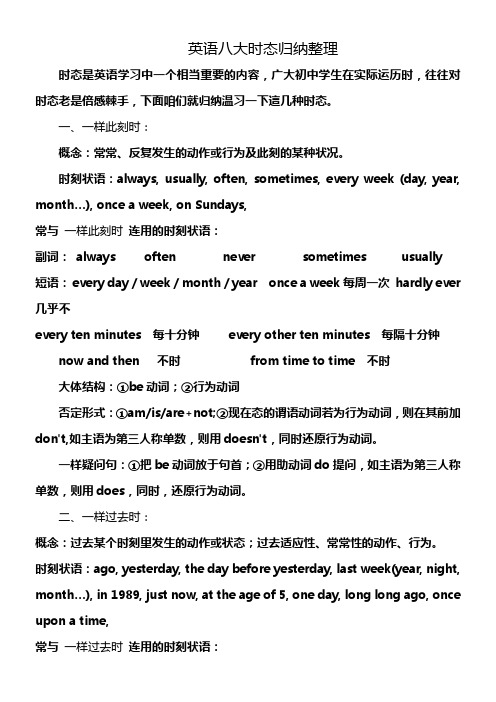
英语八大时态归纳整理时态是英语学习中一个相当重要的内容,广大初中学生在实际运历时,往往对时态老是倍感棘手,下面咱们就归纳温习一下這几种时态。
一、一样此刻时:概念:常常、反复发生的动作或行为及此刻的某种状况。
时刻状语:always, usually, often, sometimes, every week (day, year, month…), once a week, on Sundays,常与一样此刻时连用的时刻状语:副词:always often never sometimes usually短语:every day / week / month / year once a week每周一次hardly ever 几乎不every ten minutes 每十分钟every other ten minutes 每隔十分钟now and then 不时from time to time 不时大体结构:①be动词;②行为动词否定形式:①am/is/are+not;②现在态的谓语动词若为行为动词,则在其前加don't,如主语为第三人称单数,则用doesn't,同时还原行为动词。
一样疑问句:①把be动词放于句首;②用助动词do提问,如主语为第三人称单数,则用does,同时,还原行为动词。
二、一样过去时:概念:过去某个时刻里发生的动作或状态;过去适应性、常常性的动作、行为。
时刻状语:ago, yesterday, the day before yesterday, last week(year, night, month…), in 1989, just now, at the a ge of 5, one day, long long ago, once upon a time,常与一样过去时连用的时刻状语:1、副词:yesterday2、短语:last week / month / year / night last Monday lastMayyesterday morning / afternoon / evening two days ago the other day 头几天just now = a moment ago the day before yesterdayin (已过去的)某年/ 月on (已过去的)某天at (已过去的)几点钟大体结构:①be动词;②行为动词否定形式:①was/were+not;②在行为动词前加didn't,同时还原行为动词。
初中英语八种时态归纳复习 详解
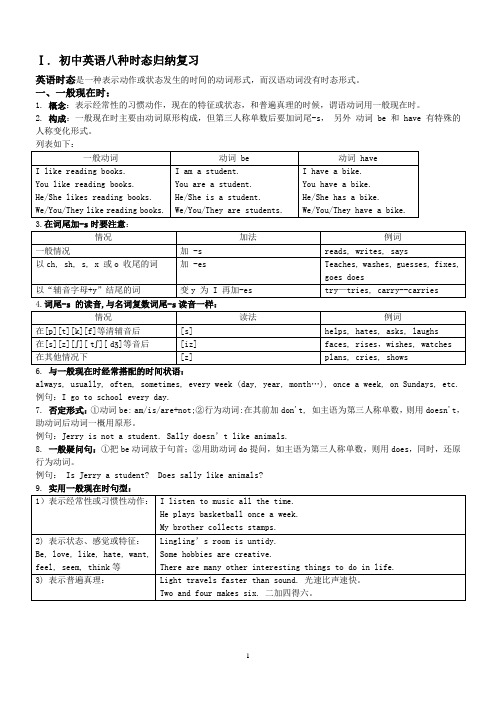
Ⅰ. 初中英语八种时态归纳复习英语时态是一种表示动作或状态发生的时间的动词形式,而汉语动词没有时态形式。
一、一般现在时:1. 概念:表示经常性的习惯动作,现在的特征或状态,和普遍真理的时候,谓语动词用一般现在时。
2. 构成:一般现在时主要由动词原形构成,但第三人称单数后要加词尾-s,另外动词be 和 have 有特殊的人称变化形式。
6. 与一般现在时经常搭配的时间状语:always, usually, often, sometimes, every week (day, year, month…), once a week, on Sundays, etc.例句:I go to school every day.7. 否定形式:①动词be: am/is/are+not;②行为动词:在其前加don't, 如主语为第三人称单数,则用doesn't,助动词后动词一概用原形。
例句:Jerry is not a student. Sally doesn’t like animals.8. 一般疑问句:①把be动词放于句首;②用助动词do提问,如主语为第三人称单数,则用does,同时,还原行为动词。
例句: Is Jerry a student? Does sally like animals?9. 实用一般现在时句型:二、一般过去时1.概念:过去某个时间里发生的动作或状态,现在已经不再继续;过去习惯性、经常性的动作、行为。
2.构成:一般过去时由动词的过去式表示,1) 动词be有 was, were 两个过去式,was 用于第一、第三人称, were 用于第二人称和第一、二、三人称的复数形式。
动词表。
读音规则:month…), in 1989, just now, at the age of 5, one day, long long ago, once upon a time, etc.4.否定形式:①was/were+not;②在行为动词前加助动词didn't,助动词后加动词原形。
(完整版)初中英语八种时态总结归纳
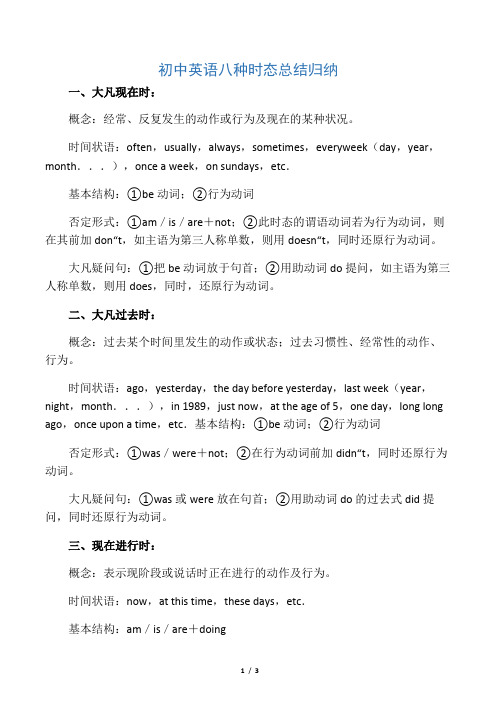
初中英语八种时态总结归纳一、大凡现在时:概念:经常、反复发生的动作或行为及现在的某种状况。
时间状语:often,usually,always,sometimes,everyweek(day,year,month...),once a week,on sundays,etc.基本结构:①be动词;②行为动词否定形式:①am/is/are+not;②此时态的谓语动词若为行为动词,则在其前加don“t,如主语为第三人称单数,则用doesn“t,同时还原行为动词。
大凡疑问句:①把be动词放于句首;②用助动词do提问,如主语为第三人称单数,则用does,同时,还原行为动词。
二、大凡过去时:概念:过去某个时间里发生的动作或状态;过去习惯性、经常性的动作、行为。
时间状语:ago,yesterday,the day before yesterday,last week(year,night,month...),in 1989,just now,at the age of 5,one day,long long ago,once upon a time,etc.基本结构:①be动词;②行为动词否定形式:①was/were+not;②在行为动词前加didn“t,同时还原行为动词。
大凡疑问句:①was或were放在句首;②用助动词do的过去式did提问,同时还原行为动词。
三、现在进行时:概念:表示现阶段或说话时正在进行的动作及行为。
时间状语:now,at this time,these days,etc.基本结构:am/is/are+doing否定形式:am/is/are+not+doing大凡疑问句:把be动词放在句首四、过去进行时:概念:表示过去某段时间或某一时刻正在发生或进行的行为或动作。
时间状语:at this time yesterday,at that time或以when引导的谓语动词是大凡过去时的时间状语等。
初中英语八种时态总结归纳
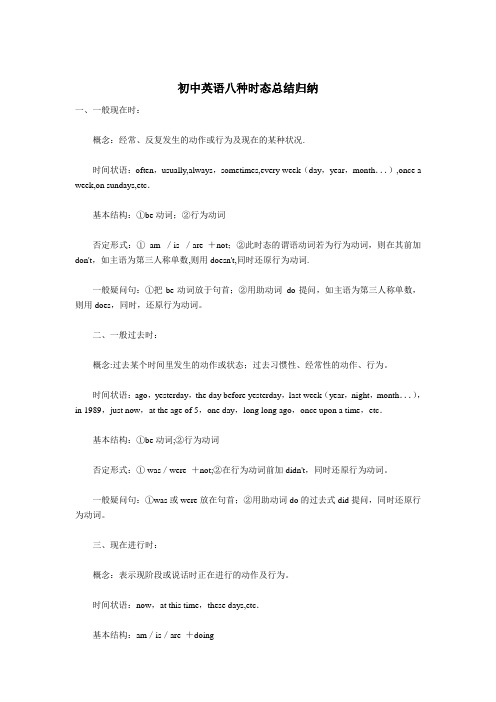
初中英语八种时态总结归纳一、一般现在时:概念:经常、反复发生的动作或行为及现在的某种状况.时间状语:often,usually,always,sometimes,every week(day,year,month...),once a week,on sundays,etc.基本结构:①be动词;②行为动词否定形式:①am /is /are +not;②此时态的谓语动词若为行为动词,则在其前加don't,如主语为第三人称单数,则用doesn't,同时还原行为动词.一般疑问句:①把be动词放于句首;②用助动词do提问,如主语为第三人称单数,则用does,同时,还原行为动词。
二、一般过去时:概念:过去某个时间里发生的动作或状态;过去习惯性、经常性的动作、行为。
时间状语:ago,yesterday,the day before yesterday,last week(year,night,month...),in 1989,just now,at the age of 5,one day,long long ago,once upon a time,etc.基本结构:①be动词;②行为动词否定形式:① was/were +not;②在行为动词前加didn't,同时还原行为动词。
一般疑问句:①was或were放在句首;②用助动词do的过去式did提问,同时还原行为动词。
三、现在进行时:概念:表示现阶段或说话时正在进行的动作及行为。
时间状语:now,at this time,these days,etc.基本结构:am/is/are +doing否定形式:am/is/are +not+doing一般疑问句:把be动词放在句首四、过去进行时:概念:表示过去某段时间或某一时刻正在发生或进行的行为或动作。
时间状语:at this time yesterday,at that time或以when引导的谓语动词是一般过去时的时间状语等。
初中英语语法八大时态总结(完整版)
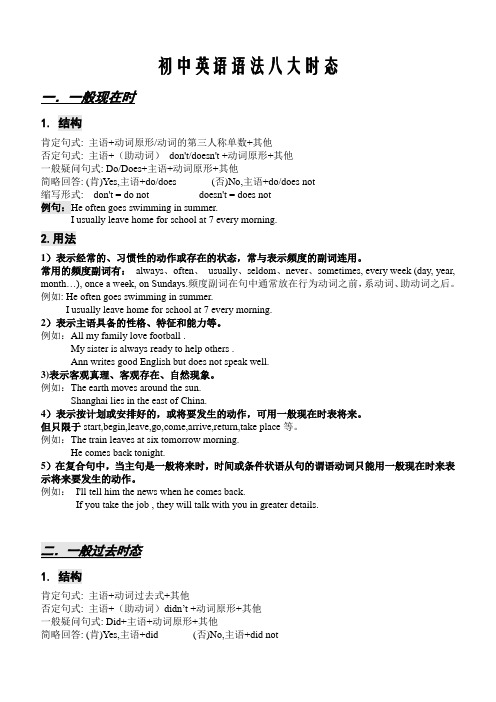
— I'm going to go fishing.
— Where is the telephone book?
— I'll go and get it for you.
两者都用于预测时,be going to意指有迹象表明某件事将要发生,属客观的推测;will则意指说话人认为/相信某件事将要发生,属主观的推测。
2)、表示说话人对于将来的看法、假设和推测,通常用于be afraid, be/feel sure, hope, know, think等后面的从句或与副词perhaps,possibly,maybe等连用。
例如:I think she’ll go back home for supper.
Maybe she’ll go to the gym.
认知类
Believe,think,understand,forget,remember
存在类
Appear,exist,lie,remain
占有、从属类
Have,own,contain,belong,possess,consist of
短暂动作类
Accept,receive,admit,decide,promise,give,finish
2)“beto+动词原形”表示客观安排或受人指示而将要做某事。
例如:We are to discuss the report next Saturday.
3)be about to +动词原形,意为马上做某事。不能与tomorrow, next week等表示明确将来时的时间状语连用,多于when引导的时间状语连用。
初中英语八种时态归纳复习要点

初中英语八种时态归纳复习要点always, usually, often, sometimes, every week (day, year, month), once a week, on Sundays, etc.基本结构:①be动词;②行为动词否定形式:①am/is/are+not;②此时态的谓语动词若为行为动词,则在其前加dont,如主语为第三人称单数,则用doesnt,同时还原行为动词。
一般疑问句:①把be动词放于句首;②用助动词do提问,如主语为第三人称单数,则用does,同时,还原行为动词。
初中英语语法时态二、一般过去时概念:过去某个时间里发生的动作或状态;过去习惯性、经常性的动作、行为。
时间状语:ago, yesterday, the day before yesterday, last week(year, night, month), in 1989, just now, at the age of 5, one day, long long ago, once upon a time, etc.基本结构:①be动词;②行为动词否定形式:①was/were+not;②在行为动词前加didnt,同时还原行为动词。
一般疑问句:①was或were放于句首;②用助动词do的过去式did 提问,同时还原行为动词。
初中英语语法时态三、现在进行时概念:表示现阶段或说话时正在进行的动作及行为。
时间状语:now, at this time, these days, etc.基本结构:am/is/are+doing否定形式:am/is/are+not+doing.一般疑问句:把be动词放于句首。
初中英语语法时态四、过去进行时概念:表示过去某段时间或某一时刻正在发生或进行的行为或动作。
时间状语:at this time yesterday, at that time或以when引导的谓语动词是一般过去时的时间状语等。
初中英语语法八大时态总结完整版初中英语时态总结
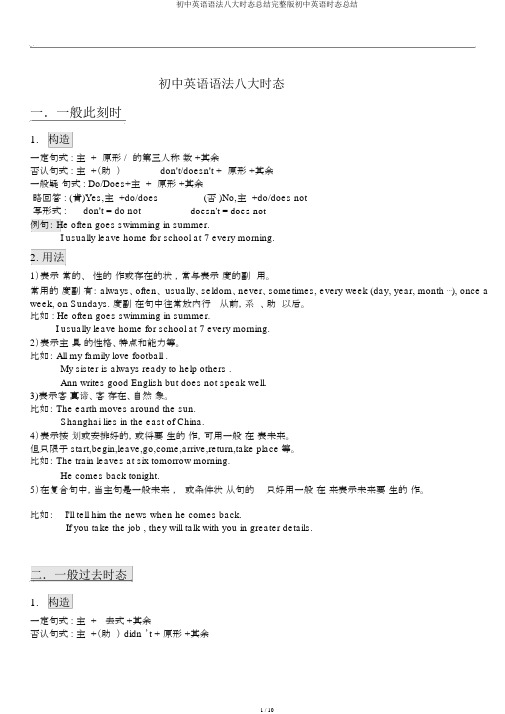
初中英语语法八大时态总结完整版初中英语时态总结初中英语语法八大时态一.一般此刻时1.构造一定句式 : 主 +原形 /的第三人称数 +其余否认句式 : 主 +(助)don't/doesn't +原形 +其余一般疑句式 : Do/Does+主 +原形 +其余略回答 : (肯)Yes,主 +do/does(否 )No,主 +do/does not写形式 : don't = do not doesn't = does not例句: He often goes swimming in summer.I usually leave home for school at 7 every morning.2.用法1)表示常的、性的作或存在的状,常与表示度的副用。
常用的度副有: always、often、 usually、seldom、never、sometimes, every week (day, year, month ⋯), once a week, on Sundays. 度副在句中往常放内行从前,系、助以后。
比如 : He often goes swimming in summer.I usually leave home for school at 7 every morning.2)表示主具的性格、特点和能力等。
比如: All my family love football .My sister is always ready to help others .Ann writes good English but does not speak well.3)表示客真谛、客存在、自然象。
比如: The earth moves around the sun.Shanghai lies in the east of China.4)表示按划或安排好的,或将要生的作,可用一般在表未来。
中考英语必考的八种时态知识汇总
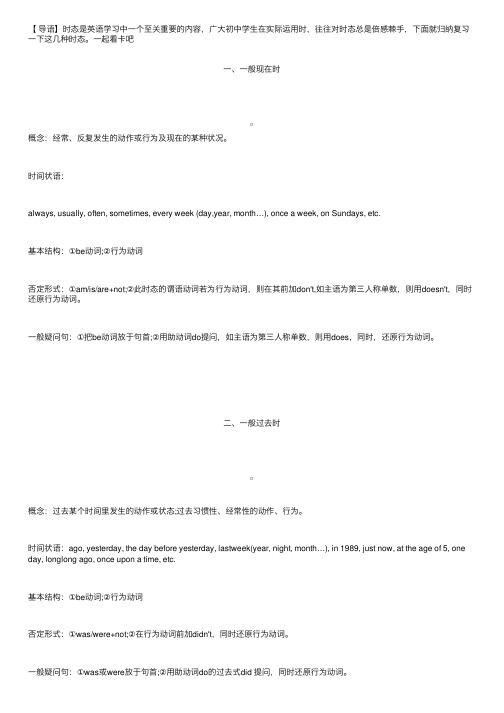
【导语】时态是英语学习中⼀个⾄关重要的内容,⼴⼤初中学⽣在实际运⽤时,往往对时态总是倍感棘⼿,下⾯就归纳复习⼀下这⼏种时态。
⼀起看卡吧⼀、⼀般现在时概念:经常、反复发⽣的动作或⾏为及现在的某种状况。
时间状语:always, usually, often, sometimes, every week (day,year, month…), once a week, on Sundays, etc.基本结构:①be动词;②⾏为动词否定形式:①am/is/are+not;②此时态的谓语动词若为⾏为动词,则在其前加don't,如主语为第三⼈称单数,则⽤doesn't,同时还原⾏为动词。
⼀般疑问句:①把be动词放于句⾸;②⽤助动词do提问,如主语为第三⼈称单数,则⽤does,同时,还原⾏为动词。
⼆、⼀般过去时概念:过去某个时间⾥发⽣的动作或状态;过去习惯性、经常性的动作、⾏为。
时间状语:ago, yesterday, the day before yesterday, lastweek(year, night, month…), in 1989, just now, at the age of 5, one day, longlong ago, once upon a time, etc.基本结构:①be动词;②⾏为动词否定形式:①was/were+not;②在⾏为动词前加didn't,同时还原⾏为动词。
⼀般疑问句:①was或were放于句⾸;②⽤助动词do的过去式did 提问,同时还原⾏为动词。
三、现在进⾏时概念:表⽰现阶段或说话时正在进⾏的动作及⾏为。
时间状语:now, at this time, these days, etc.基本结构:am/is/are+doing否定形式:am/is/are+not+doing.⼀般疑问句:把be动词放于句⾸。
四、过去进⾏时概念:表⽰过去某段时间或某⼀时刻正在发⽣或进⾏的⾏为或动作。
初中英语八种时态总结归纳

初中英语八种时态总结归纳般现在时:概念:经常、反复发生的动作或行为及现在的某种状况。
时间状语:ofte n,usually,always,sometimes,every week ( day, year,month ...), once a week, on sun days, etc.基本结构:①be动词;②行为动词否定形式:① am /is /are + not;②此时态的谓语动词若为行为动词,则在其前加don't,如主语为第三人称单数,则用does n't,同时还原行为动词。
一般疑问句:①把be动词放于句首;②用助动词do提问,如主语为第三人称单数,则用does,同时,还原行为动词。
二、一般过去时:概念:过去某个时间里发生的动作或状态;过去习惯性、经常性的动作、行为。
时间状语:ago,yesterday,the day before yesterday,last week (year,night,month...),in 1989,just now,at the age of 5,one day, long long ago,once upon a time,etc.基本结构:①be动词;②行为动词否定形式:①was/were + not;②在行为动词前加did n't,同时还原行为动词。
一般疑问句:①was或were放在句首;②用助动词do的过去式did提问,同时还原行为动词。
三、现在进行时:概念:表示现阶段或说话时正在进行的动作及行为。
时间状语:now , at this time, these days, etc.基本结构:am/is/ are + doing否定形式:am/is/ are + not+doing一般疑问句:把be动词放在句首四、过去进行时:概念:表示过去某段时间或某一时刻正在发生或进行的行为或动作。
时间状语:at this time yesterday,at that time或以when引导的谓语动词是一般过去时的时间状语等。
初中英语时态8种基本时态归纳
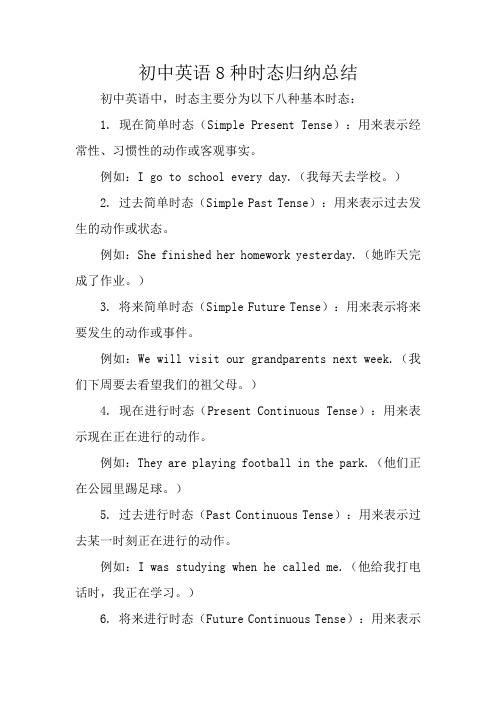
初中英语8种时态归纳总结初中英语中,时态主要分为以下八种基本时态:1. 现在简单时态(Simple Present Tense):用来表示经常性、习惯性的动作或客观事实。
例如:I go to school every day.(我每天去学校。
)2. 过去简单时态(Simple Past Tense):用来表示过去发生的动作或状态。
例如:She finished her homework yesterday.(她昨天完成了作业。
)3. 将来简单时态(Simple Future Tense):用来表示将来要发生的动作或事件。
例如:We will visit our grandparents next week.(我们下周要去看望我们的祖父母。
)4. 现在进行时态(Present Continuous Tense):用来表示现在正在进行的动作。
例如:They are playing football in the park.(他们正在公园里踢足球。
)5. 过去进行时态(Past Continuous Tense):用来表示过去某一时刻正在进行的动作。
例如:I was studying when he called me.(他给我打电话时,我正在学习。
)6. 将来进行时态(Future Continuous Tense):用来表示将来某一时刻正在进行的动作。
例如:She will be working on her project tomorrow.(明天她会一直在做她的项目。
)7. 现在完成时态(Present Perfect Tense):用来表示过去发生的动作对现在产生的影响或结果。
例如:I have finished my homework.(我已经完成了我的作业。
)8. 过去完成时态(Past Perfect Tense):用来表示过去某个时间点之前已经完成的动作。
例如:They had already left when we arrived.(当我们到达时,他们已经离开了。
初中英语八种时态归纳
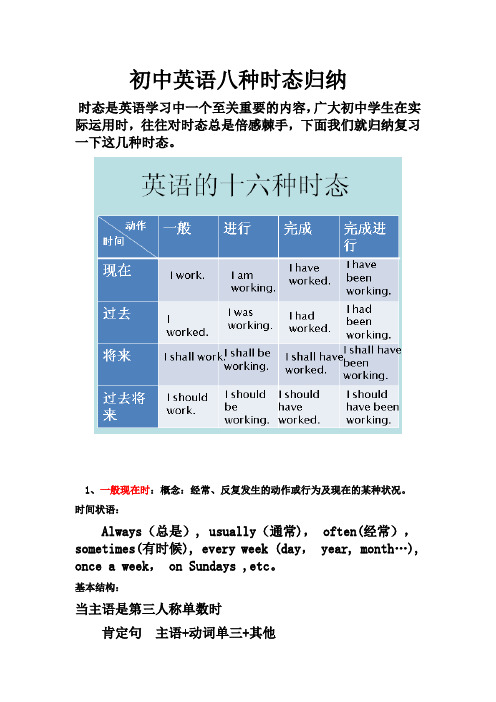
初中英语八种时态归纳时态是英语学习中一个至关重要的内容,广大初中学生在实际运用时,往往对时态总是倍感棘手,下面我们就归纳复习一下这几种时态。
1、一般现在时:概念:经常、反复发生的动作或行为及现在的某种状况。
时间状语:Always(总是), usually(通常), often(经常),sometimes(有时候), every week (day, year, month…), once a week, on Sundays ,etc。
基本结构:当主语是第三人称单数时肯定句主语+动词单三+其他否定句主语+doesn't+动词原形+其他一般疑问句 Does+主语+动词原形+其他肯定回答 Yes,主语+does否定回答 No,主语+doesn’t当主语不是第三人称单数时肯定句主语+动词原形+其他否定句主语+don’t+动词原形+其他一般疑问句 Do+主语+动词原形+其他例句:I never get up early on Sundays.特殊疑问句特殊疑问词(when,where,who,how ,etc.)+一般疑问句2、一般过去时:概念:过去某个时间里发生的动作或状态;过去习惯性、经常性的动作、行为.时间状语:ago, yesterday, the day before yesterday, last week(year,night, month…), in 1989, just now, at the age of 5, one day, long long ago, once upon a time, etc。
基本结构:主语+动词过去式+其他否定形式did+not+do+其他;一般疑问句did+主语+do+其他?例句:I went to Italy 。
I visited museums and sat in public gardens3、现在进行时:概念:表示现阶段或说话时正在进行的动作及行为。
初中英语的八种时态
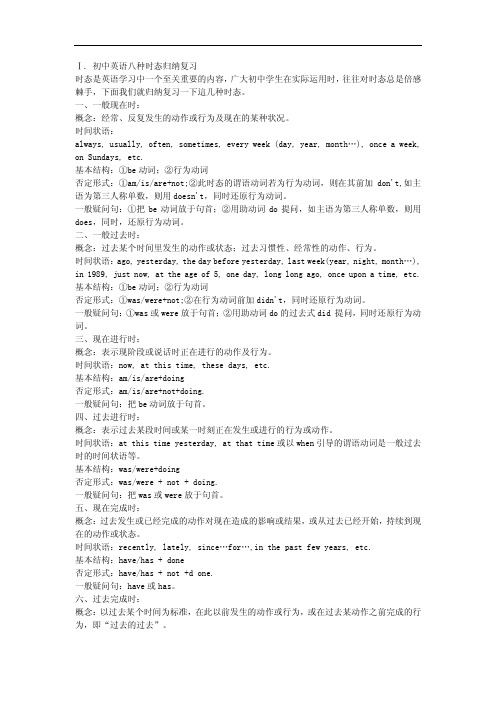
Ⅰ. 初中英语八种时态归纳复习时态是英语学习中一个至关重要的内容,广大初中学生在实际运用时,往往对时态总是倍感棘手,下面我们就归纳复习一下這几种时态。
一、一般现在时:概念:经常、反复发生的动作或行为及现在的某种状况。
时间状语:always, usually, often, sometimes, every week (day, year, month…), once a week, on Sundays, etc.基本结构:①be动词;②行为动词否定形式:①am/is/are+not;②此时态的谓语动词若为行为动词,则在其前加don't,如主语为第三人称单数,则用doesn't,同时还原行为动词。
一般疑问句:①把be动词放于句首;②用助动词do提问,如主语为第三人称单数,则用does,同时,还原行为动词。
二、一般过去时:概念:过去某个时间里发生的动作或状态;过去习惯性、经常性的动作、行为。
时间状语:ago, yesterday, the day before yesterday, last week(year, night, month…), in 1989, just now, at the age of 5, one day, long long ago, once upon a time, etc. 基本结构:①be动词;②行为动词否定形式:①was/were+not;②在行为动词前加didn't,同时还原行为动词。
一般疑问句:①was或were放于句首;②用助动词do的过去式did 提问,同时还原行为动词。
三、现在进行时:概念:表示现阶段或说话时正在进行的动作及行为。
时间状语:now, at this time, these days, etc.基本结构:am/is/are+doing否定形式:am/is/are+not+doing.一般疑问句:把be动词放于句首。
初中英语语法动词八种时态详解
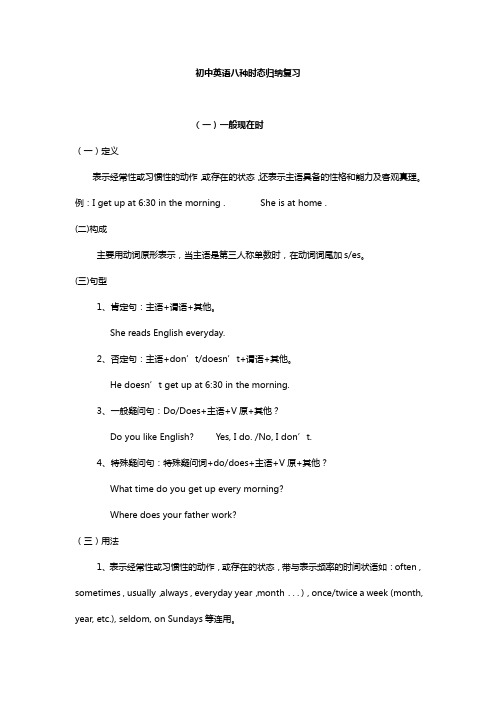
初中英语八种时态归纳复习(一)一般现在时(一)定义表示经常性或习惯性的动作,或存在的状态,还表示主语具备的性格和能力及客观真理。
例:I get up at 6:30 in the morning . She is at home .(二)构成主要用动词原形表示,当主语是第三人称单数时,在动词词尾加s/es。
(三)句型1、肯定句:主语+谓语+其他。
She reads English everyday.2、否定句:主语+don’t/doesn’t+谓语+其他。
He doesn’t get up at 6:30 in the morning.3、一般疑问句:Do/Does+主语+V原+其他?Do you like English? Yes, I do. /No, I don’t.4、特殊疑问句:特殊疑问词+do/does+主语+V原+其他?What time do you get up every morning?Where does your father work?(三)用法1、表示经常性或习惯性的动作,或存在的状态,带与表示频率的时间状语如:often , sometimes , usually,always , everyday year,month...), once/twice a week (month, year, etc.), seldom, on Sundays等连用。
I leave home for school at seven every morning.2、表示客观真理,科学事实、格言警句。
The sun rises in the east .日出东方。
The earth goes around the sun .地球绕着太阳转。
Ten minus two is eight.十减二等于八。
Light travels faster than sound .光的速度比声音的速度快。
(完整版)初中英语八种基本时态总结
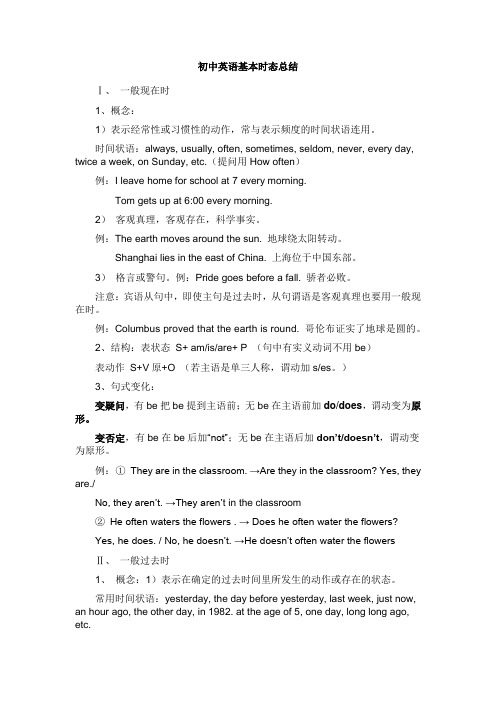
初中英语基本时态总结Ⅰ、一般现在时1、概念:1)表示经常性或习惯性的动作,常与表示频度的时间状语连用。
时间状语:always, usually, often, sometimes, seldom, never, every day, twice a week, on Sunday, etc.(提问用How often)例:I leave home for school at 7 every morning.Tom gets up at 6:00 every morning.2)客观真理,客观存在,科学事实。
例:The earth moves around the sun. 地球绕太阳转动。
Shanghai lies in the east of China. 上海位于中国东部。
3)格言或警句。
例:Pride goes before a fall. 骄者必败。
注意:宾语从句中,即使主句是过去时,从句谓语是客观真理也要用一般现在时。
例:Columbus proved that the earth is round. 哥伦布证实了地球是圆的。
2、结构:表状态S+ am/is/are+ P (句中有实义动词不用be)表动作S+V原+O (若主语是单三人称,谓动加s/es。
)3、句式变化:变疑问,有be把be提到主语前;无be在主语前加do/does,谓动变为原形。
变否定,有be在be后加“not”;无be在主语后加don’t/doesn’t,谓动变为原形。
例:①They are in the classroom. →Are they in the classroom? Yes, they are./No, they aren’t. →They aren’t in the classroom②He often waters the flowers . → Does he often water the flowers?Yes, he does. / No, he doesn’t. →He doesn’t often water the flowersⅡ、一般过去时1、概念:1)表示在确定的过去时间里所发生的动作或存在的状态。
初中英语八种时态归纳复习

初中英语⼋种时态归纳复习初中英语⼋种时态归纳复习⼀、⼀般现在时:班级:姓名:概念:经常、反复发⽣的动作或⾏为及现在的某种状况。
时间状语:always, usually, often, sometimes, every week(day,year,month…), once a week, on Sundays, etc.基本结构:①be动词——am/is/are;例如:He is a student.②⾏为动词——原形或第三⼈称单数。
例如:I usually get up at 6.He watches TV twice a week.否定形式:①am/is/are+not; 例如:He isn’t a student.②谓语动词若为⾏为动词原形,则在其前加don't。
I don’t usually get up at 6.若动词为第三⼈称单数,则在其前加doesn't,同时还原⾏为动词。
例如:He doesn’t watch TV twice a week.⼀般疑问句:①把be动词放于句⾸;例如:Is he a student?②谓语动词若为⾏为动词原形⽤助动词do提问,例如:Do you usually get up at 6?若主语为第三⼈称单数,则⽤does,同时还原⾏为动词。
例如:Does he watch TV twice a week?⼆、⼀般过去时:概念:过去某个时间⾥发⽣的动作或状态;过去习惯性、经常性的动作、⾏为。
时间状语:ago, yesterday, last week(year,night,month…), in 1989, just now, at the age of 5, etc.基本结构:①be动词——was/were;例如:I was late yesterday.②⾏为动词——过去式。
例如:I went home at nine o'clock yesterday.否定形式:①was/were+not; I wasn’t late yesterday.②在⾏为动词前加didn't,同时还原⾏为动词。
初中英语八种时态归纳复习
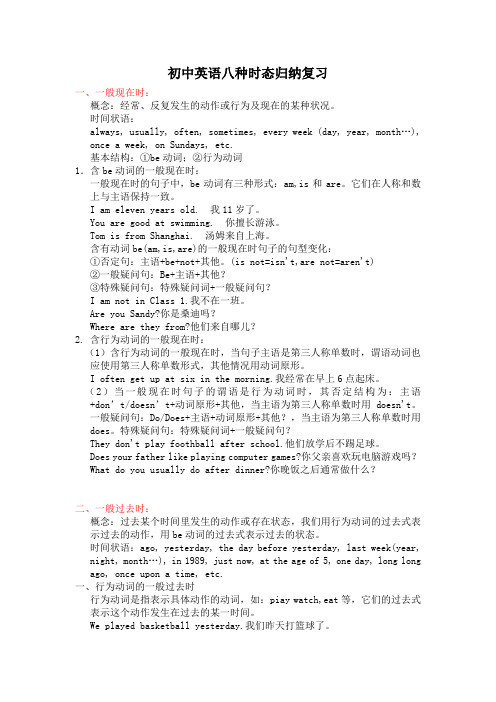
初中英语八种时态归纳复习一、一般现在时:概念:经常、反复发生的动作或行为及现在的某种状况。
时间状语:always, usually, often, sometimes, every week (day, year, month…), once a week, on Sundays, etc.基本结构:①be动词;②行为动词1.含be动词的一般现在时:一般现在时的句子中,be动词有三种形式:am,is和are。
它们在人称和数上与主语保持一致。
I am eleven years old. 我11岁了。
You are good at swimming. 你擅长游泳。
Tom is from Shanghai. 汤姆来自上海。
含有动词be(am,is,are)的一般现在时句子的句型变化:①否定句:主语+be+not+其他。
(is not=isn't,are not=aren't)②一般疑问句:Be+主语+其他?③特殊疑问句:特殊疑问词+一般疑问句?I am not in Class 1.我不在一班。
Are you Sandy?你是桑迪吗?Where are they from?他们来自哪儿?2. 含行为动词的一般现在时:(1)含行为动词的一般现在时,当句子主语是第三人称单数时,谓语动词也应使用第三人称单数形式,其他情况用动词原形。
I often get up at six in the morning.我经常在早上6点起床。
(2)当一般现在时句子的谓语是行为动词时,其否定结构为:主语+d on’t/doesn’t+动词原形+其他,当主语为第三人称单数时用doesn't。
一般疑问句:Do/Does+主语+动词原形+其他?,当主语为第三人称单数时用does。
特殊疑问句:特殊疑问词+一般疑问句?They don't play foothball after school.他们放学后不踢足球。
初中英语的八种时态
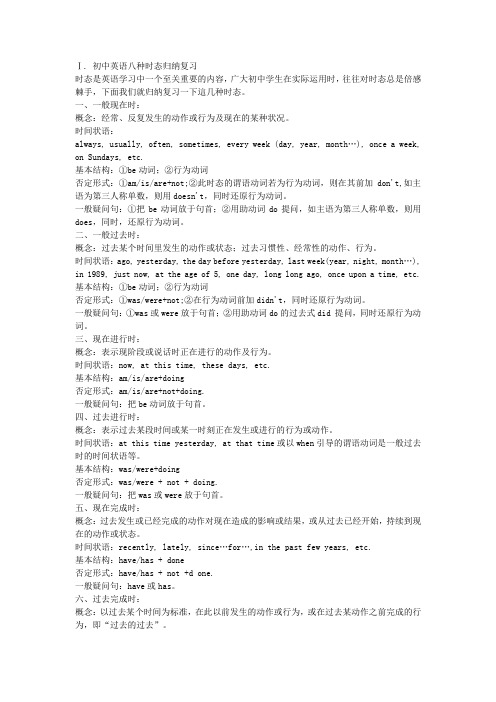
Ⅰ. 初中英语八种时态归纳复习时态是英语学习中一个至关重要的内容,广大初中学生在实际运用时,往往对时态总是倍感棘手,下面我们就归纳复习一下這几种时态。
一、一般现在时:概念:经常、反复发生的动作或行为及现在的某种状况。
时间状语:always, usually, often, sometimes, every week (day, year, month…), once a week, on Sundays, etc.基本结构:①be动词;②行为动词否定形式:①am/is/are+not;②此时态的谓语动词若为行为动词,则在其前加don't,如主语为第三人称单数,则用doesn't,同时还原行为动词。
一般疑问句:①把be动词放于句首;②用助动词do提问,如主语为第三人称单数,则用does,同时,还原行为动词。
二、一般过去时:概念:过去某个时间里发生的动作或状态;过去习惯性、经常性的动作、行为。
时间状语:ago, yesterday, the day befor e yesterday, last week(year, night, month…), in 1989, just now, at the age of 5, one day, long long ago, once upon a time, etc. 基本结构:①be动词;②行为动词否定形式:①was/were+not;②在行为动词前加didn't,同时还原行为动词。
一般疑问句:①was或were放于句首;②用助动词do的过去式did 提问,同时还原行为动词。
三、现在进行时:概念:表示现阶段或说话时正在进行的动作及行为。
时间状语:now, at this time, these days, etc.基本结构:am/is/are+doing否定形式:am/is/are+not+doing.一般疑问句:把be动词放于句首。
- 1、下载文档前请自行甄别文档内容的完整性,平台不提供额外的编辑、内容补充、找答案等附加服务。
- 2、"仅部分预览"的文档,不可在线预览部分如存在完整性等问题,可反馈申请退款(可完整预览的文档不适用该条件!)。
- 3、如文档侵犯您的权益,请联系客服反馈,我们会尽快为您处理(人工客服工作时间:9:00-18:30)。
英语的八种主要时态的结构一、一般现在时:概念:经常、反复发生的动作或行为及现在的某种状况。
例:He listens to the radio every evening.暗示性词语:always, usually, often, sometimes, every week ,every day , every year ,every month , once a week, on Sunday, etc.第三人称的变化(参考名词单数变复数):①直接加s,如listen-listens ;②以s.x.ch.sh结尾的单词后面加es,如brush-brushes;③辅音字母加y结尾,把y改为i加es,如fly-flies④以o结尾的,加es,如:do-does基本结构:①be动词;②行为动词否定形式:①am/is/are +not;②此时态的谓语动词若为行为动词,则在其前加don't,如主语为第三人称单数,则用doesn't,同时还原行为动词。
一般疑问句:①把be动词放于句首;②用助动词do提问,如主语为第三人称单数,则用does,同时,后面行为动词用原形。
二、一般过去时:概念:过去某个时间里发生的动作或状态;过去习惯性、经常性的动作、行为。
例:I was born on April 2, 1986.暗示性词语:ago, yesterday, the day before yesterday, last week , last year , last night , last month , in 1989, just now, at the age of 5, one day, once upon a time, etc.基本结构:①be动词;②行为动词变化规则:①直接加ed:work—worked look—looked play—played,②以e结尾的单词,直接加d:live —lived hope—hoped use—used,③以辅音字母+y结尾的,变y为i加ed:study—studied carry—carried worry—worried,④以元音字母+y结尾的,直接加ed:enjoy —enjoyed play—played⑤以重读闭音节结尾的,双写最后的辅音字母+ed:stop— stopped plan—planned不规则变化:is/am-was Are-were Begin-began blow –blew bring -brought否定形式:①was/were +not;②在行为动词前加didn't,后面行为动词用原形。
一般疑问句:①was或were放于句首;②用助动词do的过去式did 提问,后面行为动词用原形。
三、现在进行时:概念:表示现阶段或说话时正在进行的动作及行为。
例:The woman is talking to the doctor.暗示性词语:now, at this time, these days, etc.基本结构:am /is/are +doing否定形式:am /is/are +not +doing.一般疑问句:把be动词放于句首,其他不变。
四、过去进行时:概念:表示过去某段时间或某一时刻正在发生或进行的行为或动作。
例:We were copying the new words this time yesterday.暗示性词语:at this time yesterday, at that time或以when引导的谓语动词是一般过去时的时间状语等。
基本结构:was / were +doing否定形式:was / were + not + doing.一般疑问句:把was或were放于句首,其他不变。
五、现在完成时:概念:过去发生或已经完成的动作对现在造成的影响或结果,或从过去已经开始,持续到现在的动作或状态。
例:I have already finished my homework暗示性词语:recently, lately, since…,for+一段时间,in the past few years, etc.基本结构:have/has + done否定形式:have/has + not +done.一般疑问句:have或has放于句首。
六、过去完成时:概念:以过去某个时间为标准,在此以前发生的动作或行为,或在过去某动作之前完成的行为,即―过去的过去‖。
例:The class had already begun when I came to school.暗示性词语:before, by the end of last year(term, month…),etc.基本结构:had + done.否定形式:had + not + done.一般疑问句:had放于句首。
七、一般将来时:概念:表示将要发生的动作或存在的状态及打算、计划或准备做某事。
例:We are going to have a volleyball match tomorrow.时间状语:tomorrow, next day , next week , next month ,next year, soon , in a few minutes, by…,the day after tomorrow, etc.基本结构:①am/is/are going to + do;②will/shall + do.否定形式:①am/is/are going not to + do;②will/shall not + do.一般疑问句:①be放于句首,其他不变。
②will/shall提到句首,其他不变。
八、过去将来时:概念:立足于过去某一时刻,从过去看将来,常用于宾语从句中。
例:Did you ask Kate whether they would fly to Egypt?时间状语:the next day(morning, year…),the following month(week…),etc.基本结构:①was/were going to + do;②would/should + do.否定形式:①was/were/not + going to + do;②would/should + not + do.一般疑问句:①was或were放于句首,其他不变。
②would/should 提到句首,其他不变。
区别与联系一、一般过去时与现在完成时的区别:一般过去时:重在说明动作在过去发生时的具体情况(时间、地点、方式、对象、细节等)。
现在完成时:只提起已发生的动作(事实)及其影响,不说明动作发生时的具体情况。
cf. Have you had your lunch?What did you have for lunch?I have ever been to the Great Wall, and I went there last summer with my father.注:现在完成时表达的动作常具有反复性,故下面一句是错的:Have you seen the six thirty's news program?应改为:Did you see the six thirty's news program?现在完成进行时主要用于:表示过去开始的某一动作一直持续到现在,以至延伸到将来,它强调动作延续时间之长久。
e.g. I've been writing an article. 我一直在写一篇文章。
(还在写)cf. I've written an article. 我写了一篇文章。
(已写完)It has been raining these days. 这些天一直在下雨。
二、一般过去时与过去进行时的区别:一般过去时:强调过去某一时间开始或完成的动作。
过去进行时:强调过去某一时间正在进行的动作。
试区别下面两句:We were building a reservoir last winter.去年冬天我们在修建一座水库。
(可能尚未建成)We built a reservoir last winter.去年冬天我们修建了一座水库。
(已经建成)八、一般将来时主要用于:表示将要发生的动作或情况e.g. Tom will have a bike of his own.与这个时态连用的时间状语常用:tonight, tomorrow, the day after tomorrow, next week, in three hours, two days later 等。
三、一般将来时态与其它结构表将来情况的区别:一般将来时态:主要从时间的角度表将要发生的动作或情况。
be going to 结构:①表(主观上)打算或准备做某事时。
②表有发生某事的预兆时。
e.g. They are going to have a competition with us in studies.It is going to rain.据以上区别,故下面一句是错的:I am going to be eighteen years old next year.应改为:I shall be eighteen years old next year.be about to do sth 结构:意为―刚要做某事‖、―马上要做某事‖强调时间之紧迫性。
e.g. We are about to discuss this problem.我们将马上讨论这个问题。
be to do sth 结构:表示按计划、安排、规定将实施某事或表示注定会发生某事。
e.g. When is the train to leave.All these things are to be answered for.初中英语八大时态练习题1.I will tell him as soon as he _____ backA. comeB. comesC. will comeD. came4. _____ he ____ himself there No, I don't think so.A. Do enjoyB. Does enjoiesC. Does enjoysD. Does enjoy5. _____ your teacher ____ from them very often Certainly.A. Do hearB. Does hearC. Do receiveD. receive6. _____ your mother _____ some cleaning on SundaysA. Does doesB. Do doesC. Does doD. Do do8. Which teacher _____ lessons to you every dayA. does givesB. does giveC. do giveD. gives9. Smith does not go fishing on weekdays, ____ _____ , he does.A. does he NoB. does he YesC. doesn't he NoD. doesn't he Yes10.Mr Black often _____ fishing on Sundays, _____ heA. goes doesn'tB. goes isn'tC. doesn't go doesD. doesn't go is11.He usually _____ TV on Sunday evening.A. watchB. watchesC. watchingD. is watching12. We'll go to play with snow if it ______ tomorrow.A. snowB. snowsC. will snowD. snowed13. Neither I nor he ______ French.A. speakB. doesn't speakC. speaksD. doesn't speak14. Nobody ______ how to run this machines.A . know B. have known C. knows D. is knowing15. The Young Pioneer _____ water for the old man every day.A. carryB. bringC. takesD. carries16. Some are ______ in the river and some are ______ games.A. swimming playingB. swimming plaiingC. swimming I playingD. swimming plaing17. Look ! The boy students are ___ football while the girls are _____ .A. playing danceB. playing dancingC. play dancingD. play dance18. He _____ to do his lessons at eight every evening.A. is beginningB. is beginningC. beginD. begins19. _____ he _____ on well with his friends this termA. Does getsB. Does getC. Is gettingD. Is geting20. Mr Smith _____ short stories, but he ____ a TV play these days.A. is writing is writingB. is writing writesC. writes is writingD. writes writes22. Look, they______ a good time, ____ theyA. ha ve…doB. have…don'tC. are having…areD. are having aren't25. He often _____ late in the forest. It _____ me very much.,A. staye dworriedB. staied worriedC. stayed worryedD. staied worried26. I ______that the boy _____ with no tears in his eyes.A. noticed cryedB. noticed criedC. noticed criedD. noticed cryed29. ______ a sports meet last Sunday Yes , they ______.A. Did they have didB. Did they have hadC. Had they hadD. Had they did30. ____ you _____out for a walk after supper Yes, I ______.A. Did went wentB. Did go wentC. Did went didD. Did go did31. __ Jack _____ on with his work or ______ to have a restA. Did went stoppedB. Did go stopC. Did went stopD. Did go stopped32. You gave them a talk two days ago, _____you Yes, I ______.A. did didB. did gaveC. didn't didD. didn't gave33. ____ your brother _____ a letter to My father.A. Who wroteB. What wroteC. Who did writeD. What did write35. He ______ some cooking at that time, so _____ me.A. did heardB. did didn't hearC. was doing heardD. was doing didn't hear37. This time yesterday Jack _____ his, bike. He _____ TV.A. repaired didn't watchB. was repairing watchedC. repaired watchedD. was repairing wasn't watching38. We _____ for Tom at ten last Sunday. He often kept us ______.A. were waiting waitingB. were waiting waitC. waited waitingD. waited wait39. When you _____ at the door, I _____ some washing.A. knocked didB. was knocking didC. knocked was doingD. knock am doing40. The boy_____ English on the radio when I _____ his door.A. learned was openingB. was learning openedC. learned openedD. is learning open41. When they______ through the forest, a bear _____ at them.A. walked… was comingB. were walking… cameC. were talking… comesD. walk… is coming43. While mother _____ some washing, I ______ a kite for Kack.A. did madeB. was doing madeC. was doing was makingD. did was making44. I ___ myself French from 7 to 9 yesterday morning. I ____ to work.A. was teaching didn't goB. taught didn't goC. was teaching wentD. taught went47. The teacher_____ (give) us a history lesson when T om walked into the classroom. gave B. is giving C. was given D. was giving49. We ______ class meeting this November.A. hadB. haveC. will haveD. are having50. He ______ in his garden every morning next year.A. will workB. worksC. workedD. is working58. If he ______ to college, he _____ a lot more.A. will gowill learnB. will gois going to learnC. is going is going to learnD. goes will learn59. When she _____ next time ,l ______ her everything.A. is going to come shall tell 、. will comes hall tellC. comes w ill tell、D. come will tell66. She _____that she _____ her best to help them the next term.A. says will doB. said will doC. said would doD. says would do62. People _____ that the Smiths _____ for a holiday next week.A. say will goB. said will goC. said would goD. say would go63. Nobody _____ us that he _____ even stricter with usA. tell will beB. tells would beC. told will beD. told would be65. Jack _____ that they _____ surprised to see it this Friday.A. know would beB. knows will beC. knew would beD. knew will be76. " He ____ to draw horses already ."" When ____he ". " Last year. "A. learned hasB. learned didC. has learned hasD. has learned did78. _____you _____ the text yet Yes, we _____ it two hours ago. A. Didcopy did B. Have copied haveC. Have copied didD. Did copy had80. _____ you ______ the film before Where ____ you _____ itA. Have… seen… did… seeB. Did…see…die…watchC. Have…seen… have… seenD. Did…see…have…seen82. Where _____John _____ To the library. He _____ there for an hour.A. has been has goneB. hasgone has beenC. did go wentD. did be went83. _____ the baby still _____ No, it ______ crying.A. Has cried has stoppedB. Is crying stoppedC. Did cry stoppedD. Is crying has stopped85. _____ you ever _____America Yes, I have.A. Have gone toB. Have gone inC. Have been toD. Have been in86. My brother _______ college for over three years.A. has gone toB. has been toC. has been inD. has been for87. He _____ the Army by the end of 1992. He ____ in the army since then.A. joined is B. has joined has beenC. had joined isD. has joined has been89. Jack ____ over five lessons by seven o'clock. Then he____ a test.A. went tookB. went had takenC. had gone tookD. had gone had taken92. I _____ him a second letter before I _____ from him.A. wrote heardB. wrote had heardC. had written heardD. have written hear94. They ____for five hours when they ____ in New York.A. flew arrivedB. had flown had arrivedC. flew had arrivedD. had flown arrived95. She ____ that ____ it for two days by that day.A. says has rainedB. says had rainedC. said had rainedD. said rained97. He _____ angry because he _____ for a long time.A. had got had waitedB. got waitedC. had got waitedD. go thad waited99. The Greens _____ China for five years.A. has been inB. have been inC. went toD. has gone to。
